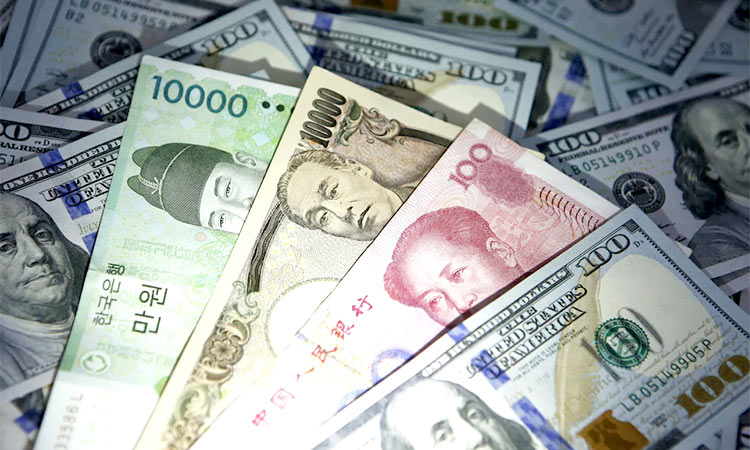France cut its budget deficit to 12-year low in 2018

French President Emmanuel Macron at the Elysee Palace in Paris on Tuesday. Associated Press
The budget deficit came in at 2.5 per cent of gross domestic product, the lowest level since 2006 and down from 2.8 per cent in 2017, INSEE said on Tuesday in first estimates for France’s 2018 public accounts.
The 2018 deficit was also lower than the 2.7 per cent foreseen in last year’s budget law and marked the second year in a row in which France had respected an EU limit of 3 per cent, which Paris had flaunted for a decade prior to 2017.
Budget Minister Gerald Darmanin said the improvement vindicated the government’s strategy of reining in spending while also cutting taxes.
“We need to keep up the effort obviously because the public accounts remain in bad shape,” he added, speaking on French radio RTL.
The government expects the deficit to rise to 3.2 per cent this year as a payroll tax credit scheme becomes a permanent tax cut, adding temporary pressure to the public finances.
With the deficit lower than expected last year, the national debt was steady at 98.4 per cent of GDP.
Meanwhile, public spending, which is among the highest of developed countries, eased to 56.0 per cent from 56.4 in 2017 while the overall tax burden on the economy slipped to 45.0 per cent from 45.2 per cent in 2017.
Slightly better than expected growth last year helped keep down the deficit and debt last year. INSEE said the economy grew 1.6 per cent, better than the 1.5 per cent it had reported in preliminary estimates.
Growth even held up at the end of the year at a quarterly rate of 0.3 per cent despite a series of violent anti-government protests that weighed on business and consumer confidence.
The scrapping of a payroll tax for unemployment insurance helped boost households’ purchasing power, a key demand of protestors who say they get pinched by hefty taxes and a high cost of living.
Gross disposable incomes grew in the fourth quarter at the fastest pace 11 years, but household spending stagnated as consumers squirreled away the extra cash, pushing the savings rate to the highest level since the third quarter of 2012. Meanwhile, Italy readies new package to lift GDP, mini-budget ruled out -sources * Govt to cut GDP forecast but sees 2019 growth still positive * Expects Q1 GDP data to show shallow recession is over * Readying “growth decree” to boost public, private investments (Adds quotes, details, background) By Gavin Jones and Giuseppe Fonte ROME, March 26 (Reuters) - Italy is preparing a package of measures to lift economic growth this year and avoid the need for belt-tightening measures, political sources told Reuters, confirming a strategy which favours fiscal expansion over austerity.
The package is part of a plan to allow the government to present a relatively upbeat 2019 projection for gross domestic product which will in turn be the basis of new deficit and debt targets to be issued next month, the sources said.
The “growth decree”, which the cabinet hopes to pass on Friday, will increase tax breaks on investments, cut property taxes on factories and warehouses, and simplify procedures for public tenders, according to a draft seen by Reuters.
Among an array of measures, it will also allow local authorities to spend more on investments and introduce new rules to help banks shed so-called “unlikely-to-pay” loans.
The timing of the decree is important because it comes shortly before the Treasury presents new public finance targets in its Economic and Financial Document (DEF), which is due by April 10. This forms the framework of the 2020 budget.
Italy fell into recession over the second half of 2018, with gross domestic product falling 0.1 per cent in each of the last two quarters. This hit the carry-over effect on 2019 and left the official forecast of 1 per cent 2019 GDP growth per cent looking wildly optimistic.
That forecast will be cut in the DEF but it will remain in positive territory and above those of most independent economists, said three sources in the government of the anti-establishment 5-Star Movement and the right-wing League.
The sources asked not to be named because they were not authorised to talks about the DEF.
Recent Italian data has shown signs of improvement, leading to optimism among policy-makers that the country has already emerged from last year’s shallow recession.
In January, industrial output, orders and sales all jumped from the month before and employment increased. That was followed by an unexpected pick-up in service sector activity in February. “It’s early days but there is a feeling the worse may be behind us,” said one government source. Three officials said they expected GDP to be flat or positive in the first quarter.
Reuters



